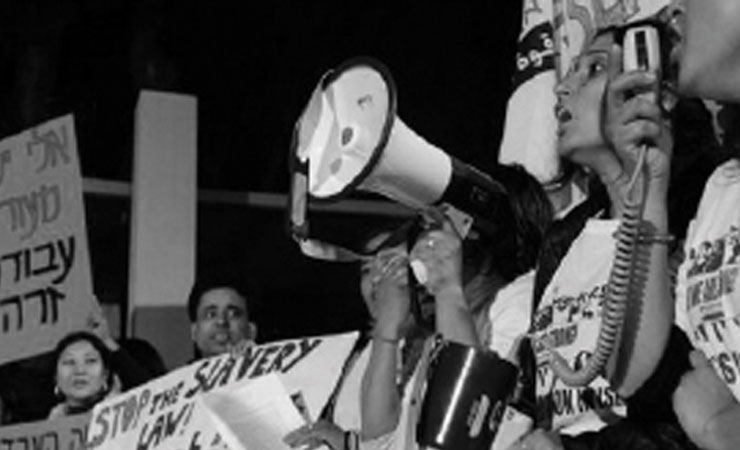In her column “When the Weak Become the Strong” (August 28th 2013) Yael Gvirtz protests against the “insensitivity and aggressiveness” of Kav Laoved in deferring the case of the caregiver, who took care of her father, to court. Gvirtz forgot to mention, and perhaps she does not know, that it is not Kav Laoved who is insensitive and aggressive, but rather the State of Israel. It is the state that requires migrant workers to settle their rights with their employers within 60 days of the termination of work connections. After that period the workers become “illegal residents” and they face arrest and deportation. In this case Gvirtz refused to pay the worker the minimal benefits he was entitled to — including his last salary—before the 60 days were up and therefore there was no choice but to take issue to court. True, this is insensitive and aggressive but not on the part of the worker or the NGO helping him, but rather on the part of the state who brings in caregivers to support those in need and then stipulates strict regulations pertaining to the status of the workers and the means of their employment, forgetting that these caregivers, like their patients, are human beings.
Gvirtz, who prides herself on being a partner to Kav Laoved’s way of thought, portrays in her column an additional phenomenon which is also not rare. It appears the social justice often stops when it crosses the gates to the pockets and the home. Thus, at the stroke of a pen, the man who looked after Gvirtz’s father for five solid years, working day and night, for only a minimum wage, become in her column a “Robber” (“Gazlan” in Hebrew) . This only because he requested to resign from his difficult job which had started to affect his own health. Additionally, if Gvirtz were indeed “a true supporter of aiding victims of discrimination and deprivations” she would hardly have chosen to call the worker’s resignation “abandoning” although the worker handed in his resignation ahead of time as required by law. The word “abandoning” in the context of work relation is being applied in recent years to caregivers and not by chance. The employment of these workers and the expectations from them goes well beyond those of a regular work relationship. They cannot conduct a personal life, they are obligated to live in the patient’s home and they are on call 24 hours a day. The choice to resign is conceived of as “neglect” or “abandonment”— words drawn from a completely different world of concepts, a world of family responsibility: of children to elderly parents or parents to their young children.
The patient’s family vigorously assigns the familial obligations to the caregiver, in a manner which is not in line with the nature of the relationship. It seems that Gvirtz, as is the case with many other families, has forgotten that these workers have their own families, obligations, responsibilities, yearnings, and needs—all stemming from their being human beings. The fulfillment of the worker’s rights, which in the case had no alternative but taking quick legal action – after all negotiation attempts with Gvirtz outside of court had been exhausted – is simply a return to the worker’s true responsibility: the economic obligations towards his family, both immediate and extended.
Gvirtz was given generous space in this newspaper to express her views. It is a pity that she didn’t use this to raise public awareness to the true problems in the field of caregiving, first and foremost withdrawal of state involvement in its proper funding and regularization, harming both patients and caregivers. Instead Gvirtz chose to slander Kav Laoved.
Gvirtz’s piece was about 400 words long and appeared in the opinion column of “24 Hours” supplement of “Yediot Aharonot” whereas Kav Laoved’s response was published in the back pages and was only 200 words long. Looking at Gvirtz’s column opposite to Kav Laoved’s response, gives a decisive answer to the question posed: “Who is the weak and who is the strong?” The newspaper “Yediot Aharonot” gave Gvirtz ample space to express her opinion whereas the response of the NGO representing the worker was put in an insignificant part of the newspaper and limited to a shorter length. Thus it appears obvious that Gvirtz’s voice overcomes that of the worker. While Gvirtz tried to present herself as being the weak side, pitted against the “strong” worker backed by the NGO, her powerful stand is revealed and she has exploited her position as a reporter who regularly writes opinion columns in the newspaper for unbridled tongue-lashing of the caregiver whose voice, together with that of other caregivers, is not heard since they are absent from the dialog concerning them.


